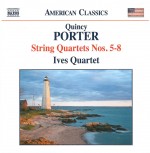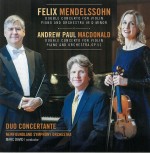 Duo Concertante, the Newfoundland-based duo of violinist Nancy Dahn and pianist Timothy Steeves, have followed up their outstanding set of the complete Beethoven Sonatas with an equally satisfying CD of Double Concertos for Violin, Piano and Orchestra by Felix Mendelssohn and Andrew Paul MacDonald (Marquis Classics MAR 81463). Marc David conducts the Newfoundland Symphony Orchestra, apparently in their recording debut.
Duo Concertante, the Newfoundland-based duo of violinist Nancy Dahn and pianist Timothy Steeves, have followed up their outstanding set of the complete Beethoven Sonatas with an equally satisfying CD of Double Concertos for Violin, Piano and Orchestra by Felix Mendelssohn and Andrew Paul MacDonald (Marquis Classics MAR 81463). Marc David conducts the Newfoundland Symphony Orchestra, apparently in their recording debut.The Mendelssohn D Minor Concerto is a remarkably assured work written – quite astonishingly – when the composer was only 14 years old. It is performed here in the version with winds and timpani that Mendelssohn added to the original string scoring shortly after the first private performance of the work in 1823. There are clear stylistic links with Mozart and Beethoven, but the grace and lyricism of the mature composer are already in evidence. Dahn and Steeves both display the perfectly judged tone and style that made their Beethoven set such an outstanding success, as well as shining in the virtuosic passages.
The MacDonald Double Concerto Op.51 was commissioned by Duo Concertante some 15 years ago after they heard the composer’s Violin Concerto and was premiered with the NSO in 2000. It really is a very attractive and convincing work, essentially in traditional concerto form but cast in a single movement with the three sections separated by cadenzas. The Duo has performed both concertos numerous times since then, and the two works are perfect companions on a really attractive CD.
The NSO apparently includes student and community members as well as professionals, but you’d never know it – the playing here is never less than top-notch.
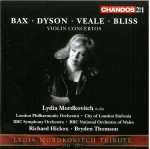 The Russian violinist Lydia Mordkovitch, who died last December at the age of 70, lived the second half of her life in Britain and was a founding artist for Chandos Records, for whom she made over 60 recordings. The 2-CD set of British Violin Concertos is one of four re-issues of her recordings that the label released in July as a Lydia Mordkovitch Tribute, and it’s simply stunning (CHAN 241-53). The four concertos are by Sir Arnold Bax, recorded in 1991 with the London Philharmonic Orchestra; Sir George Dyson, recorded in 1994 with the City of London Sinfonia; Sir Arthur Bliss, recorded in 2006 with the BBC National Orchestra of Wales; and John Veale, recorded in 2000 with the BBC Symphony Orchestra. Bryden Thomson conducts the Bax; Richard Hickox the other three works.
The Russian violinist Lydia Mordkovitch, who died last December at the age of 70, lived the second half of her life in Britain and was a founding artist for Chandos Records, for whom she made over 60 recordings. The 2-CD set of British Violin Concertos is one of four re-issues of her recordings that the label released in July as a Lydia Mordkovitch Tribute, and it’s simply stunning (CHAN 241-53). The four concertos are by Sir Arnold Bax, recorded in 1991 with the London Philharmonic Orchestra; Sir George Dyson, recorded in 1994 with the City of London Sinfonia; Sir Arthur Bliss, recorded in 2006 with the BBC National Orchestra of Wales; and John Veale, recorded in 2000 with the BBC Symphony Orchestra. Bryden Thomson conducts the Bax; Richard Hickox the other three works.
The concertos by Bax (1938) and Bliss (1955) are exactly what you would expect from two main-stream mid-20th-century English composers in their prime: wonderfully strong, richly melodic works with outstanding idiomatic solo parts and brilliant orchestration.
The music of John Veale was completely new to me, which was somewhat puzzling given that I was still living in England when he would have been in his prime; his romantic tonal music, however, had been swept aside by the avant-garde movement in England in the mid-1960s, when the likes of Stockhausen, Boulez and Henze ruled the roost, and there were virtually no performances or broadcasts of his work. As a result Veale wrote nothing for 12 years, and the striking Violin Concerto from 1981-84 marked his return to composition. Certainly his style hadn’t changed: you can hear echoes of his work in the British film industry in the 1940s and 1950s, and also more than a hint of two of his favourite composers, William Walton and – in particular – Samuel Barber. The slow movement is absolutely beautiful.
The real gem here, though, is the Dyson, again someone whose orchestral music will be new to most people. It’s a simply glorious four-movement work from 1941: large (44 minutes), expansive, sweeping, lushly orchestrated, and quite symphonic in feel. Mordkovitch’s playing is simply sublime, as it is throughout the entire set.
If this issue is in any way indicative of Mordkovitch’s contribution to the British music scene then it magnifies the loss – but what a marvellous way to be remembered. It’s a wonderful set, and an absolute must-buy for anyone even remotely interested in 20th-century violin concertos.
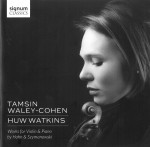 The new CD by the English violinist Tamsin Waley-Cohen and the Welsh pianist Huw Watkins of Works for Violin & Piano by Hahn & Szymanowski (Signum Classics SIGCD432) was a real revelation in two ways: I don’t recall having heard the performers or the works on the disc before.
The new CD by the English violinist Tamsin Waley-Cohen and the Welsh pianist Huw Watkins of Works for Violin & Piano by Hahn & Szymanowski (Signum Classics SIGCD432) was a real revelation in two ways: I don’t recall having heard the performers or the works on the disc before.
My not knowing Waley-Cohen is the more difficult to explain; she has issued five previous CDs, enjoys a wide-ranging career and has garnered a great deal of critical acclaim. When Ruggiero Ricci calls you “the most exceptionally gifted young violinist I have ever encountered,” you’re clearly headed in the right direction. It’s easy to hear why: her dazzling technical assurance and interpretative subtlety are clear from the outset.
You may know the two violin concertos by Karol Szymanowski, but possibly not the Violin Sonata in D Minor, Op.9. It’s a lovely melodic early work in the Romantic vein, written when the composer was 21. I’m not sure what the connection between Szymanowski and Reynaldo Hahn is supposed to be – the booklet notes call it “a somewhat tenuous one,” which is putting it mildly – but it really doesn’t matter when it means that works like the Romance in A Major, the Violin Sonata in C Major and the Nocturne in E-Flat Major are given wider exposure, especially in performances like these. The Sonata in particular is a beautiful work full of French refinement and harmonic subtlety and some particularly lovely piano writing.
A terrific performance of Szymanowski’s Nocturne and Tarantella, Op.28 provides a passionate and brilliant end to a CD that features outstanding playing from both performers.
Since 2007, incidentally, Waley-Cohen has played the Stradivarius violin previously owned by Lorand Fenyves, so long a fixture at the University of Toronto’s Faculty of Music.
Concert note: Szymanowski’s Sonata in D Minor Op.9 will be performed by Annette-Barbara Vogel and Durval Cesetti at the Don Wright Faculty of Music at Western University on October 16 and at the Kitchener-Waterloo Chamber Music Society on November 4.
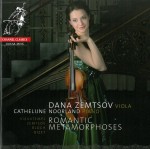 Romantic Metamorphoses is the second of three CDs the 23-year-old Netherlands-based violist Dana Zemtsov will be recording for the Channel Classics label and features the Dutch pianist Cathelijne Noorland as accompanist (CCS SA 37215).
Romantic Metamorphoses is the second of three CDs the 23-year-old Netherlands-based violist Dana Zemtsov will be recording for the Channel Classics label and features the Dutch pianist Cathelijne Noorland as accompanist (CCS SA 37215).
The Sonata in B-Flat Major Op.36 is one of four works that the violinist/composer Henri Vieuxtemps wrote for the viola. It’s a lovely work that clearly shows what Zemtsov calls his lyrical romanticism, and one that eschews virtuosity for its own sake: Vieuxtemps’ pupil Eugène Ysaÿe quoted the composer as saying “Not runs for the sake of runs – sing, sing!” Zemtsov’s big, warm tone and effortless technique certainly enable her playing to sing here.
Evgeni Zemtsov’s Melodie im alten Stil for viola and piano has a very special meaning for the soloist: it was written by her grandfather for the young viola player who would become his fiancée, and who would give birth to Dana Zemtsov’s father a year later. It’s a short piece, but simply lovely.
The Swiss-American composer Ernest Bloch, who was a pupil of Ysaÿe, has rarely received the attention his compositions merit. His Suite ‘1919’ for viola and piano was written a few years after his first move to the USA in 1916, and won him a Coolidge Prize in 1919. It’s an expansive and fascinating piece with some exotic subtitles for the four movements: In the Jungle: Life in the Primitive World and Grotesques: Simian Stage, for instance. Zemtsov describes it as a “romantically fantasized adventure through savage nature and tribes under the sun in the jungle.” It gives both players ample opportunity to shine.
Mention a Carmen Fantasy for violin and orchestra and Sarasate’s composition based on Bizet’s melodies usually comes to mind, but a different one by Franz Waxman has long been a cult favourite with violinists. It’s played here in a Mikhail Kugel arrangement for viola and piano, and provides a spirited end to the CD.
Review
While he was on the faculty at Cleveland’s Mannes School of Music from 1917 to 1920 Ernest Bloch taught a number of young American composers, among whom was Quincy Porter. Porter’s String Quartets Nos.5-8 feature on a new CD from Naxos (8.559781), which continues to issue terrific recordings of music that, if not exactly off the beaten track, thrives along the sides of the main musical highways. Quartets Nos.1-4 were issued on Naxos 8.559305 in 2007, to glowing reviews.
Porter was a professional string player in the 1920s, and the four works here, written between 1935 and 1950, show just how well he understood the medium: they are idiomatic and immediately accessible, very appealing, strongly tonal and highly expressive.
Recorded between 2008 and 2012, the performances by the Ives Quartet are of the highest quality.
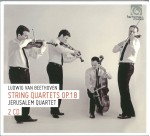 There’s another beautiful set of Beethoven string quartets available, this time from the Jerusalem Quartet, which is currently celebrating its 20th anniversary. Their main focus for the 2015/16 season is the six quartets of Béla Bartók, which they will be presenting in three different concert formats; one of these will be a four-concert cycle combining the Bartók with the six Beethoven String Quartets Op.18. The new 2-CD set of the Op.18 works on Harmonia Mundi (HMC 902207.08) is the first of two album releases which will mark the ensemble’s anniversary; Bartók’s Quartets Nos.2, 4 and 6 will be released in early 2017.
There’s another beautiful set of Beethoven string quartets available, this time from the Jerusalem Quartet, which is currently celebrating its 20th anniversary. Their main focus for the 2015/16 season is the six quartets of Béla Bartók, which they will be presenting in three different concert formats; one of these will be a four-concert cycle combining the Bartók with the six Beethoven String Quartets Op.18. The new 2-CD set of the Op.18 works on Harmonia Mundi (HMC 902207.08) is the first of two album releases which will mark the ensemble’s anniversary; Bartók’s Quartets Nos.2, 4 and 6 will be released in early 2017.
Beethoven came relatively late (he was 30) to the string quartet genre, but you would never know it from the quality of these works – hardly surprising, perhaps, given that he carefully studied the late quartets of both Mozart and Haydn before setting to work. These performances by the Jerusalem Quartet are everything you could wish for and everything you would expect from an ensemble that has been playing together for 20 years. It’s a terrific set.
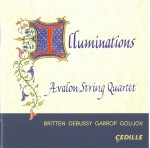 Illuminations is another fascinating CD from Cedille Records, featuring the Avalon String Quartet in works by Debussy, Britten, Osvaldo Golijov and Stacy Garrop (CDR 90000 156). There’s a lovely reading of Debussy’s String Quartet in G Minor Op.10 to start things off, followed by four quite fascinating short pieces by the young Benjamin Britten. The Three Divertimenti (a March, Waltz and Burlesque) were written in 1933 by the 19-year-old composer as part of a projected five-movement suite and are startlingly modern – the March sounds like Dag Wirén meets Bartók. Revised in 1936 under the present title, they remained unplayed during the composer’s lifetime after the initial unsuccessful performance. Alla marcia is in the same vein and from the same period and was originally planned as the opening movement for the suite.
Illuminations is another fascinating CD from Cedille Records, featuring the Avalon String Quartet in works by Debussy, Britten, Osvaldo Golijov and Stacy Garrop (CDR 90000 156). There’s a lovely reading of Debussy’s String Quartet in G Minor Op.10 to start things off, followed by four quite fascinating short pieces by the young Benjamin Britten. The Three Divertimenti (a March, Waltz and Burlesque) were written in 1933 by the 19-year-old composer as part of a projected five-movement suite and are startlingly modern – the March sounds like Dag Wirén meets Bartók. Revised in 1936 under the present title, they remained unplayed during the composer’s lifetime after the initial unsuccessful performance. Alla marcia is in the same vein and from the same period and was originally planned as the opening movement for the suite.
Golijov’s evocative and effective Tenebrae from 2000 ends the CD, but the focal point is the String Quartet No.4: Illuminations, the 2011 work by the Chicago-based Garrop that gives the disc its title. It’s a charming piece that is essentially a meditation on five stunning illustrations from the 15th-century Book of Hours known as The Hours of Catherine of Cleves, now in the Pierpont Morgan Library in New York. Eleven short pieces depict the opening of the book, the five illuminations with two interludes, and finally the closing of the book at the end of prayer.
The Avalon Quartet has been together for 20 years now, but this is their first recording for the Cedille label. They’re in top form throughout a lovely disc.


